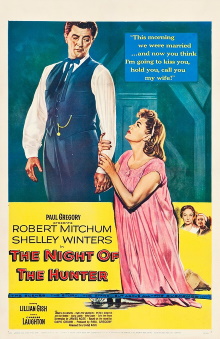This is considered a thriller film but I think it really should be horror instead, as in old-fashioned Brothers Grimm tales meant to scare children. The villain is so evil that it’s a wonder Robert Mitchum agreed to play him. The film was a failure on release such that it became the one and only film of its director Charles Laughton. Today it is considered one of the all-time greats with lines and shots from it having influenced numerous other films. Personally I could do without the ending that goes the traditional route of trying to impart a moral lesson but otherwise it truly is a very frightening film, surprisingly so for one of its era.
In the depths of the Great Recession, a man kills two men for money and entrusts it to his two children, making them promise to tell no one where it is. He is arrested and executed shortly afterwards but the money is never recovered. But Harry Powell, a self-appointed preacher, learns of the case while sharing a cell with this man, and goes looking for the family. He charms the local townsfolk and woos the widow Willa until she marries him. The son John is suspicious of Harry throughout and admonishes his sister Pearl to be careful and to remind her promise. But he lets slip the fact that he does know where the money is and after Harry marries his mother, his attempts to question the children turn violent. One night Willa hears him threatening the children and realizes that he really has been after the money all along. He responds by murdering her and so the children flee, forced for fend for themselves out in the world.
This film achieves the heights of terror that it does by doing so many things right. Visually it resembles older films of the silent era, with its deep shadows and sharp contrasts. It evokes old fairy tales about children lost and doomed, with shots of toads and other dark creatures and minimalistic detail during the fateful boat ride down the river. The audience is kept on the edge as the children clumsily try to get away while Harry pursues them like an unstoppable monster. Most of all, Harry is such an effective, memorable villain. His loud singing of church hymns presages his appearance, transforming something that is usually reassuring into a harbinger of evil. He also seems truly insane instead of just duplicitous as on some level, he does believe in what he says. He cares nothing for sex and treats women as if they were wicked and sinful. This just makes him even more frightening and only the children realize how evil he truly is as his righteousness has all of the adults fooled.
It doesn’t quite get everything right though. It leans heavily on the character of John as a foil to Harry but the child actor Billy Chapin is no match for Mitchum. But mostly I’m unsatisfied by how the film ends. Essentially a savior pops out of nowhere to save the two children in their darkest hour, the proverbial Good Christian to show up Harry as a false preacher so that he doesn’t get away with a misleading portrayal of what Christianity is supposed to be like. Once she appears the entire tone of the film changes as it switches gears to criticize the immorality of the times, such as how young girls are easily duped by men’s promises of love or how the townswoman who pushed Willa into marrying Harry transforms into an overzealous accuser. It’s clumsy and patronizing in all of the stupid ways that old films get when they try to impart a moral lesson.
As I noted, when first released this film did so badly that Laughton who is mainly known as an actor never tried to make another film again. But its reputation improved over time until it is considered as a great classic today. Certainly this is because of the character of Harry Powell, who is so convincingly villainous that you can be believe he can casually kill children and then preach verses from the Bible immediately afterwards. That makes this an effective horror film even in the present day though we do have to make allowances for the weak ending.
